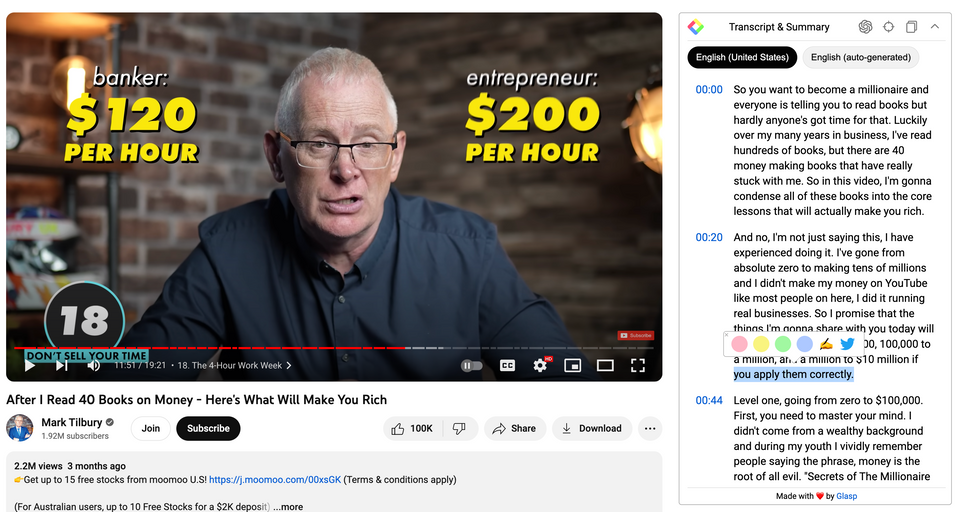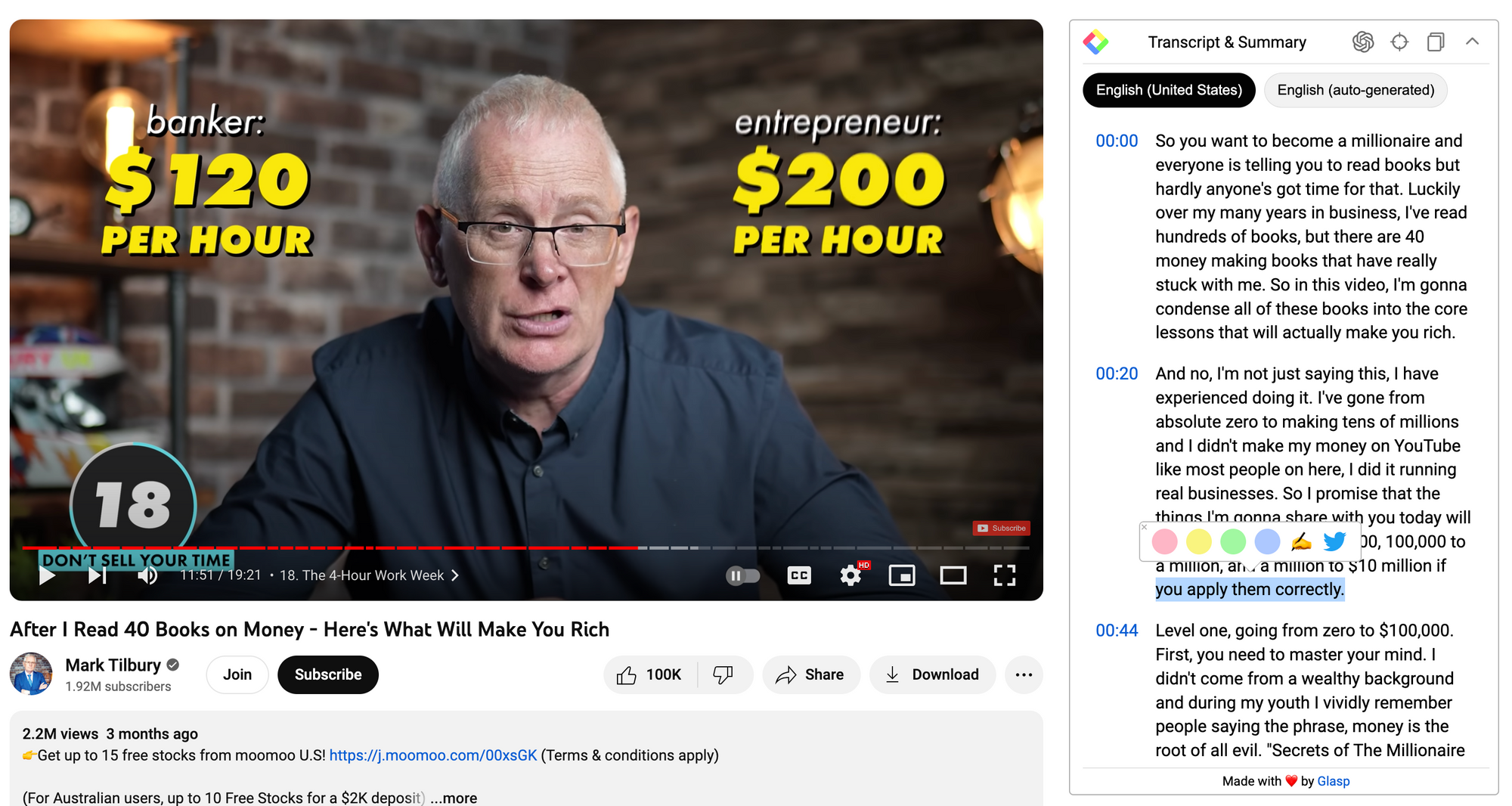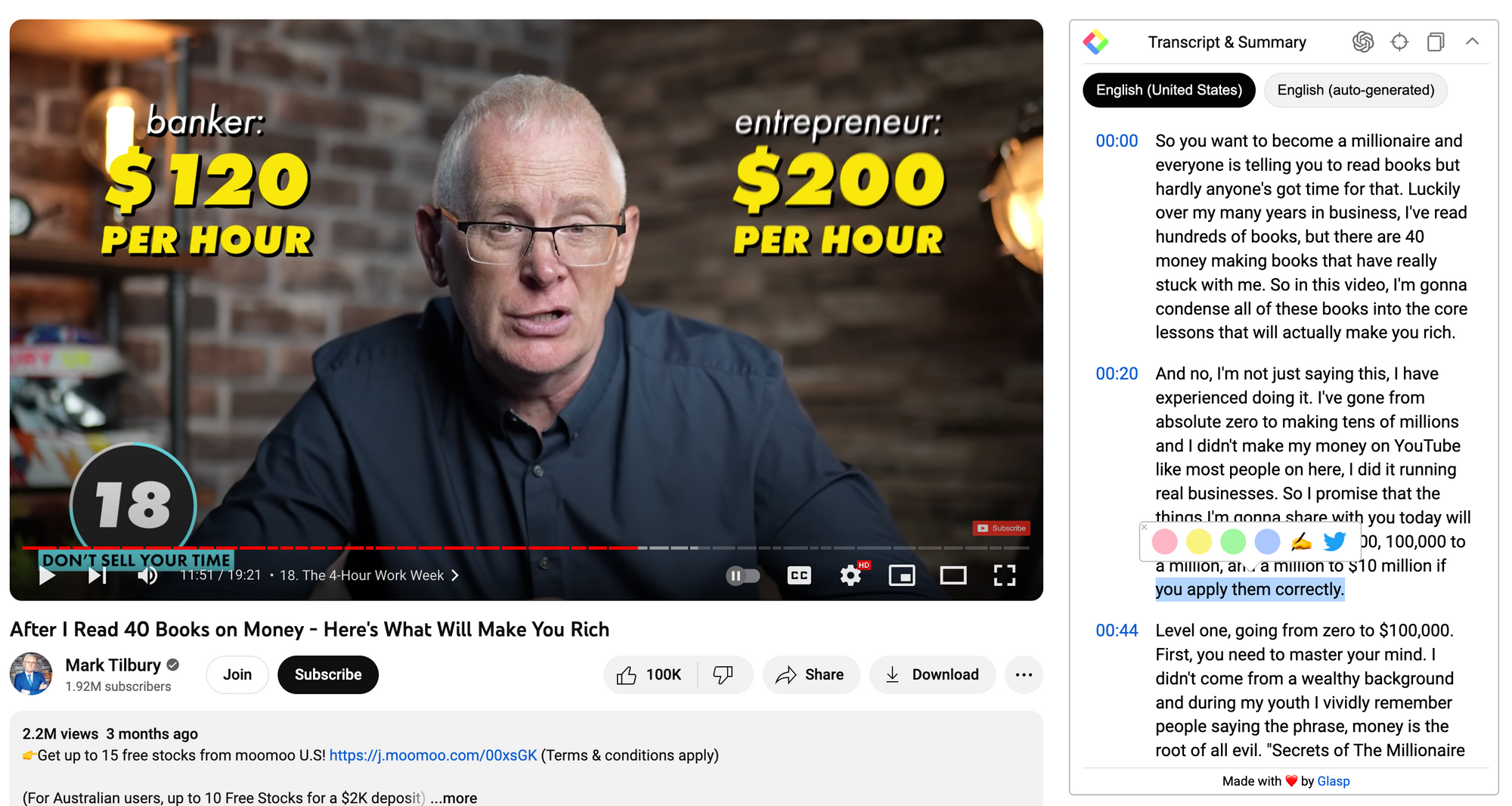Mark Tilbury - Unlocking the Secrets to Financial Freedom: Principles and Habits for a Prosperous Life : Summary and Q&A

Introduction
In today's fast-paced world, the path to financial freedom and success often seems elusive. This video dives deep into the principles, mindset, and habits that can lead to wealth and prosperity. Drawing insights from bestselling books and personal experiences, we'll unveil the roadmap to a richer, more fulfilling life. Join us on this enlightening journey!
Summary
Mindset is Key:
- Overcome negative beliefs about money.
- Understand that money equals freedom and control.
- Think big and set achievable goals for consistent wins.
Develop Good Habits and Skills:
- Focus on things within your control.
- Use techniques like habit stacking.
- Build unique skill sets that AI cannot replicate.
Understand Personal Finance and Investing:
- Recognize the difference between assets and liabilities.
- Avoid trying to beat the market; instead, focus on stable investments.
- Invest in stocks based on the company's actual value, not just market demand.
Business and Earning More:
- Aim to be a business owner or investor for greater earning potential.
- Use "Blue Ocean Strategy" to find unique business niches.
- Provide value first to attract and retain customers.
Leadership and Growth:
- Effective leaders inspire action and maintain a calculated approach.
- Ensure profitability in business by prioritizing profits before expenses.
- Stay informed about larger global trends and events to protect and grow wealth.

Q&A
Q: How does one's mindset impact their financial growth?
A: The mindset plays a pivotal role in financial success. The speaker mentions the phrase, "money is the root of all evil," and how such beliefs can negatively program individuals to view wealth. Overcoming such mental hurdles is crucial. Books like "Secrets of The Millionaire Mind" emphasize the need to eradicate negative associations with money and embrace it as a tool for freedom and control.
Q: What's the difference between being rich and being wealthy?
A: According to "The Psychology of Money," being rich might be evident through outward displays of luxury, but true wealth is more concealed. Wealth is reflected in the decisions to not purchase certain items or indulge in every luxury. It's the cars not bought, the diamonds forgone, and other expenditures avoided. Essentially, wealth is what you don't see.
Q: Why is "thinking big" crucial for success?
A: "The Magic of Thinking Big" illustrates that many people limit their potential by setting their goals too low or too soon. Having grand visions and aspirations is the first step to achieving great success. While just thinking big won't guarantee success, it's a necessary starting point.
Q: How does success in the real world differ from academic achievements?
A: The speaker's personal experience demonstrates that real-world success doesn't always correlate with academic prowess. Books like "The Winner Effect" suggest a positive correlation between success and testosterone levels and how early wins can lead to increased future successes. The environment in which you're placed and your passion for what you do significantly impacts success.
Q: How can you manage stress effectively?
A: "The Essence of Success" provides a unique perspective on stress, likening a vast fog to a small glass of water. It implies that the overwhelming feeling of stress can be condensed and controlled. It's crucial to focus on aspects within our control and avoid being overwhelmed by external factors.
Q: What is the importance of habits in building wealth?
A: Effective habits, as highlighted in "Atomic Habits," are essential. Many focus on the end goal instead of the process of achieving it. Techniques like habit stacking, which pairs a new habit with an existing one, can be incredibly effective. "The Seven Habits of Highly Effective People" emphasizes the importance of direction and purpose.
Q: How does one identify which skills to develop for maximum impact?
A: "So Good They Can't Ignore You" suggests that passion for a job often comes after gaining expertise in it. "The Unfair Advantage" recommends leaning into one's natural strengths and unique capabilities, especially in a world where AI is making many skills redundant.
Q: What's the difference between assets and liabilities?
A: A critical lesson from "Rich Dad Poor Dad" is discerning between assets and liabilities. Everything we buy falls into one of these categories. Understanding this differentiation is fundamental for sound financial decisions and effective investment strategies.
Q: How can one go beyond just selling their time to earn money?
A: "Cash Flow Quadrant" outlines ways to earn money beyond traditional employment. Moving from being an employee or self-employed to becoming a business owner or investor can significantly increase earning potential and break the limits of time-for-money transactions.
Q: Why is leadership crucial in the journey to wealth?
A: Leaders inspire action. They are often calculated, as described in "The 48 Laws of Power," ensuring that others remain dependent on them. Successful leaders understand the nuances of human psychology and employ strategies from books like "Influence: The Psychology of Persuasion" to foster trust and loyalty, which are crucial in business and wealth accumulation.
Before you leave

